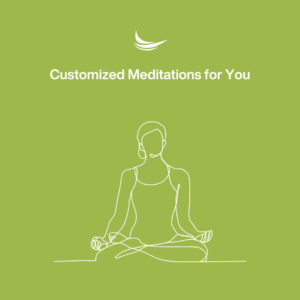Customized Meditations for You
 What comes to mind when you hear the word meditation? Stereotypes hold some people back from mindfulness practice. That is unfortunate. It is important to dispel the myths and understand the things people get wrong about mindfulness.
What comes to mind when you hear the word meditation? Stereotypes hold some people back from mindfulness practice. That is unfortunate. It is important to dispel the myths and understand the things people get wrong about mindfulness.
Before I was introduced to a wide variety of mindfulness meditations, I did not fully appreciate the benefits of meditation. After exploring the different types of meditations that are available, and practicing exercises by myself and with others, I have learned which ones are particularly helpful. The same thing is true when working with clients.
Did you know that there are many different types of meditation? It has been a lot of fun learning and practicing meditation. It has made a significant difference in my own life, and I invite you to experience yourself.
If you have not tried meditation before or would like to find ways to implement meditation as part of your practice, your therapist is a wonderful resource. CARE Counseling offers its therapists access to a vault of resources that can be customized to each client’s individual needs.
Are you interested in learning more about breathing?
Try diaphragmatic breathing.
Your therapist can teach you breathing techniques such as diaphragmatic breathing which you can do on your own or as part of meditation. Coming back to one’s breath is a reminder within many meditation exercises, as you move out of your thoughts. There are many breathing exercises to try that can promote calm and relaxation.
Do you want to get better at noticing what you are experiencing in your body?
Try body scan meditations.
You will learn how to mindfully notice the sensations that you experience in each part of the body, as you take the time to go through each part. This is often done while seated or lying down. Noticing and naming is an important part of mindfulness practices; the body scan is an excellent way to practice this.
Is it hard for you to sit still but you would like to incorporate mindfulness?
Try walking meditations.
Meditation does now have to be done sitting upright with eyes closed or while lying down. Walking meditations are a great want to incorporate awareness of the body’s thoughts and emotions experienced while moving the body.
Do you connect with nature?
Try nature-based meditation.
These often pair well with guided imagery such as being rooted or grounded. Examples of nature-based meditations include feeling your body and mind as a lake mountain meditation, and forest visualizations. It can be incredibly powerful to practice these in natural settings.
Are you experiencing a particular stressor (or emotion)?
Try tailored meditations for specific situations and emotions.
There are tailored meditations for working with anxiety or stress, for working with difficulties, for preparing for difficult conversations, and for uncertain times. If you are struggling with worries, regret, or shame, there are meditations to address all these areas and more.
Keep in mind that this is only a sample of mindfulness activities!
Written By: Charlotte Johnson, MA, LPCC



























